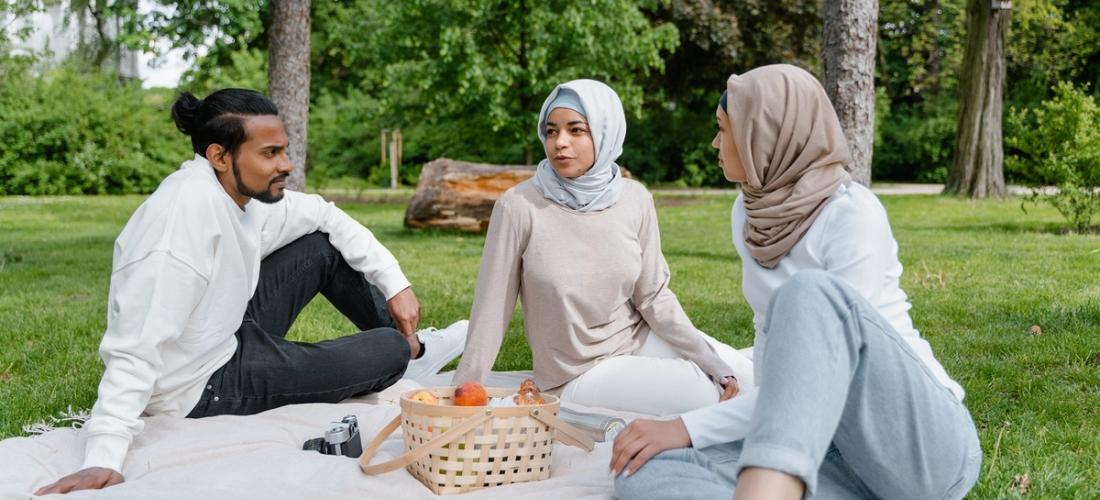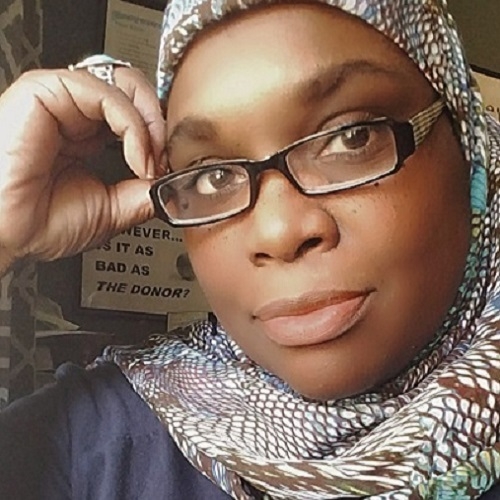To Answer or Not to Answer (Hijab-Related Queries) – THAT is the Question
Lifestyle
|
Jan 12, 2023
|
7 MIN READ

Image source: Pexels; photo by MART PRODUCTION
Editor's note: It's our annual #LikeYouMeanItHH beginning-of-the-year reflection time! What does it mean to "wear it like you mean it?" We invite you (and ourselves) to renew our intentions and reflect on what our hijab (and faith and other areas of our lives) mean to us.
I sat at the end of a conference room table, stirring tepid tea in a paper cup with a little wooden stirrer. It had been a long day of meetings made longer by the woman sitting next to me. Over the past two days of the conference, we met and became comfortable with each other, comfortable enough for her to ask me questions about Islam and my hijab.
The woman sighed and folded her arms, leaning back in her chair. “I just don’t get it,” she said loud enough to catch the attention of everyone sitting at the table. The fine lines around her mouth and eyes deepened with her frown. “Why do you have to cover your hair for men?”
I stopped stirring and dropped the stirrer, letting it hit the side of the cup. I scanned the room, noticing that everyone stared at me. There it was. A censure of my faith that put me in a position to defend my choice to wear hijab. It only took the woman two days of beating around the bush with benign questions to get to the point where she felt brave enough to express her disapproval and put me on the spot. Unfortunately for her, I did not feel the need to justify myself.
I straightened my back and squared my shoulders, turning slightly to the woman. “It’s not for you to get.” She opened her mouth, but I raised my hand, stopping her. “Please, no more questions.” I reached into my conference bag and pulled out a folder. “I want to focus on the conference. You can Google for more information.” I opened the folder and took a sip of my tea, sending the clear message that I would not entertain her or anyone else any further.
As she sputtered an apology, I tucked my hijab around my face and read, shutting her and the rest of the world out. I had had enough.

Layla Abdullah-Poulos
From the time I converted to Islam and started wearing hijab, I (like so many covered Muslim women) have been asked questions about my decision to cover. Friends, family members, co-workers and strangers posed a range of inquiries about the fabric covering my head and my religion. Some questions are easy enough to answer and from people truly interested in getting to know more about me and my faith. Unfortunately, I’ve also encountered questions steeped in scorn for me, my Islam and my choice to wear hijab. I became adept at ascertaining the difference and decided to respond no longer to the latter type of questions.
Muslim women in hijab become automatic poster children for the faith, whether they like it or not, due to their visibility. As a result, they are on the front lines of the social representation of Islam and subject to questions generated from curiosity and misconceptions. Yes, a question is an opportunity to educate, but we have to consider a few things in choosing to answer these questions
Our mental fortitude and capacity to answer is one. Another is intent. We must assess the questions and the questioner's intent before deciding to answer. Our reasons for taking the time and energy to give an answer or reject a question are grounded in faith and social interactions. So when is it worth it to answer questions about the hijab and when is it not? Let’s explore.
(Here are 11 common questions hijab-wearing Muslim women are often asked and answers they can give or upon which they build longer answers.)
Dawah and Self Reflection
Giving dawah (the act of teaching about Islam and inviting non-Muslims to learn more and possibly become Muslim themselves) is an important part of many Muslims' lives. A Muslim woman motivated to spread the word about Islam may see answering questions about her hijab and modest mode of dressing as an important opportunity to give dawah.
People may ask questions about hijab because they’re curious about Islam and want to know more about it, allowing us to highlight it as a spiritual source of inspiration. Answering questions allows us to extol the beauty of our faith and worship by explaining why we wear hijab and addressing other questions around it.

Image source: Pexels
Questions posed out of genuine interest also afford us the opportunity to reflect on what wearing hijab means to ourselves spiritually and individually. It can lead us to do some important self-reflection upon our own intentions behind why we wear hijab. When we take the time to explain the significance of hijab and its protocol, it reinforces our commitment to it and reminds us of its importance to us and our relationship with Allah (S).
Answering questions about hijab can benefit both the questioner and the Muslim woman being asked, making us more likely to repeatedly answer the same questions (e.g., Do you have to wear it at home?). Some of these questions may seem silly or annoying but are harmless if the person asking them seems to have a genuine interest or lack of knowledge.
My editor Dilshad recalls a non-Muslim friend of hers, who early on in their friendship said she wanted to ask a few questions about her hijab and faith practices that would probably sound stupid because she truly was ignorant, and did she mind? Indeed, she did not mind.
It is understandable not to feel compelled to answer these types of ill-intent people and questions. In fact, it’s perfectly fine to shut that nonsense down and not engage in questions and answers.
Not every person who asks questions has a malicious intent. But, it may feel tiresome or ignorant of those asking sometimes. We may want to tell them to please do a little reading and Googling and find the answers themselves, especially if we just don’t have the time or mental capacity to do so. And that’s ok. Let’s give ourselves some grace. But there is also a lot of good to be gained in educating others (who genuinely want to be educated) and debunking the perpetuating stereotypes around hijab.
However, sometimes, a person may pose a question to put us on the defensive. Like the woman at the conference, they may want us to justify ourselves because of their distaste for hijab and Islam. They may ask leading questions or betray their inner intent to take what we are saying and see it through a negative lens no matter how we explain things.
Ill Intentions, Sarcasm and Islamophobia
In addition to an act of worship, hijab is a social and visible symbol to which some people have an aversion because of their distaste for Islam or prejudices and misconceptions they have about the faith and Muslim women. Like the woman I encountered at the conference, they may ask questions to express their aversions to hijab-wearing Muslim women (or Muslim women in general) and attempt to put them on the defensive.

Image source: Pexels
It can be difficult when facing a question that makes you feel like your faith and decision to practice it is on trial. You may have mixed emotions about answering questions when you sense that the questioner is being snide, sarcastic or Islamophobic. The drive to defend yourself and to give dawah may prompt you to answer such questions, but take caution. You may find that the questioner prioritizes their distaste or discomfort with you as a covered Muslim woman and your faith.
It is understandable not to feel compelled to answer these types of ill-intent people and questions. In fact, it’s perfectly fine to shut that nonsense down and not engage in questions and answers.
Assessing the vibe a person gives when asking questions about your hijab becomes necessary, and once you’ve determined that a question is posed with ill intent, do not feel the need to respond. Prioritize your spiritual well-being and politely decline to answer. There are plenty of resources for someone to attain information about Islam. If they’re interested, they can seek those out.
How can one tell if a questioner has ill intent or just wants to project their views upon your answers? Well, time and experience gives us a lot of insight into separating the wheat from the chaff. Plus, as you get to know people, you will be able to tell if they’re the kind of person who sincerely listens and wants to learn or if they take what you say and impose their own stereotypes onto it.
And when you’re too tired or unwilling to engage and answer questions, direct them to HH’s FAQ about 11 common questions people ask Muslim women about their hijabs.
Over the years, I have learned that my wearing hijab can be a source of personal inspiration for others and a means to raise understanding about the deen. I have also learned to take the time to determine if it’s worth it to answer questions about hijab or if it’s better to decline and preserve my emotional and spiritual well-being. Experience is a great teacher, and Insha’Allah it will teach you how to make the call about answering or not answering as well.
Subscribe to be the first to know about new product releases, styling ideas and more.
What products are you interested in?

